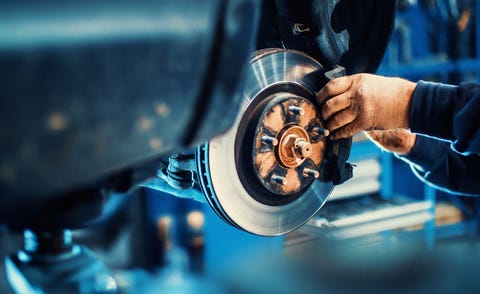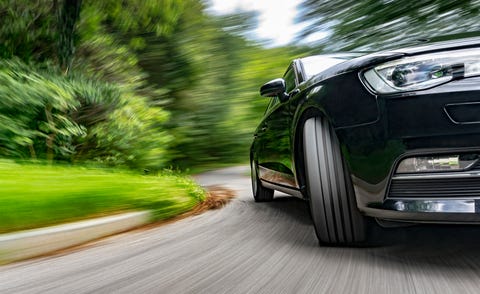There's nothing more important on a car than properly functioning brakes. It's a safety issue, and it's also about confidence: Feeling that your brakes aren't up to the task of stopping your car is plain unnerving. You don't need the stress.

But how long do brakes last? And when should you replace them? Luckily, there are a few easy ways to know when it's time to get your brakes checked or replaced.
Why Brake Pads Wear
Disc brakes slow and stop your car by using brake calipers (they're like large, adjustable clamps) to squeeze brake pads (they look a little like hockey pucks sawed in half) against the brake discs, also known as rotors (Frisbee-sized metal discs). When you push the brake pedal, it causes the calipers to clamp down on the brake pads, which squeeze the rotors, transferring the kinetic energy of your car into thermal energy—heat—via friction. The friction created is what cuts the speed and brings your car to a halt. As the pads rub against the rotors, they both wear down slowly; the black dust you see on the wheels of some cars is the residue from the pad material and steel rotor that has worn off. Brake pads are an integral part of your car's disc-braking system, and making sure they are in good condition is crucial to your safety.
How to Know If Your Brakes Are Worn Out
Disc brakes generally give a few clear indications that it's time for a brake job. The first is something you can hear: Once brake pads are worn to the point of needing replacement, a thin metal strip in the pads will make a screeching noise or squeal when you apply the brakes. The noise is generally audible when the windows are up, but it may be masked by loud music or other environmental noise. However, not all cars have this feature, which is called a mechanical brake-wear sensor or a brake scraper, so check to see if yours does.
If you hear a scraping or a deeper grinding noise, it could well be that the brake pads have worn down to their metal backing plates and that those plates are being squeezed directly against the steel brake discs. This is dangerous. It reduces your stopping power significantly; your brakes won't slow the vehicle adequately or possibly not at all if you let this go on for any length of time. This situation will also destroy your brake discs and possibly cause the brake system to fail entirely. Have any squealing or grinding noises checked immediately.
A second way to know that it's time to replace brakes is to visually check them. Look through the wheel spokes. You just might be able to see the outboard brake pad, where it touches the brake disc. If you can see it, make sure there is at least a quarter inch of material on the brake pad. If there is less, you should have the brakes checked; most likely, they'll need to be replaced. If you can't see the pad by looking through the spokes, then jack up the car (here's how to do it correctly and safely), remove a front wheel, and check for pad wear. Bolt the wheel back on, jack up the rear of the car, remove a rear wheel, and check a rear brake as well. You'll probably need a trouble light or flashlight to see the pads clearly in the dark fender wells. (If you want to be thorough, check all four brakes.) The photo below shows what brake pads look like, with a new one on the left and one that's roughly half worn on the right.
What is often a simple pad replacement can turn into a far costlier and more complicated brake job if you find the pads worn and then ignore the situation. As noted above, if the pads have completely worn down, you will soon hear a grinding sound that means the pads' backing plates are making contact with the brake rotors. If that happens, get ready to pay big bucks; you'll need to replace chewed-up brake discs.
Other Indicators of Brake IssuesThere are other symptoms of brake trouble that don't involve wear to the brake pads. If your brakes don't stop as readily as they used to, and if the pedal feels mushy, rather than firm, or slowly sinks toward the floor, there's likely another problem. This could be water or air in the brake fluid, a fluid leak in the system, or a failing brake master cylinder. If you have any of these systems or see a puddle of liquid left behind by your car when parked, see a trusty repair shop or dealer.
If your car pulls to one side during braking, the brakes may be wearing unevenly, there might be a leak in one of the brake lines, or you might have an issue with your steering or front suspension that's unrelated to brakes. If you feel a vibration or pulsation in the brake pedal during normal braking, this means your rotors are warped and require truing to smooth them out—or possibly replacement. If you've been driving aggressively or using the brakes hard while descending a mountain road, this brake roughness might abate when the brakes cool. If the vibration or pulsing continues, that is another sign they need to be inspected.
Certain environments and driving situations cause brakes to wear at a faster rate. If you live in a mountainous area or a hilly city such San Francisco, your brakes may wear quicker than if you lived in the flatlands of the Midwest. In the more wear-prone locations, you'll want to check your brakes more frequently.
There's no more important a component on your car than your brakes, and now you know what to look and listen for to ensure they keep working properly. By being proactive in maintaining them, you'll save you money in the long run, and you'll stay safe.





0 Nhận xét